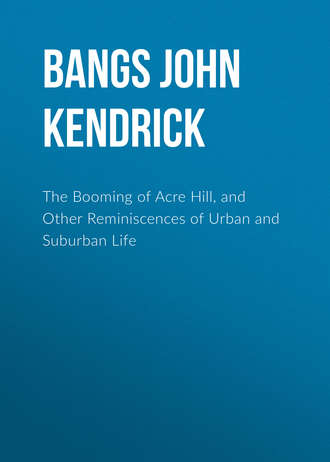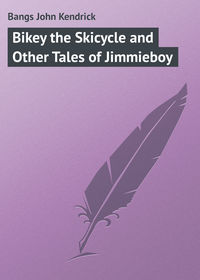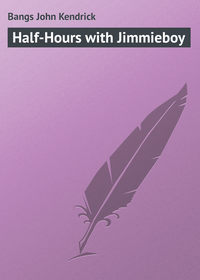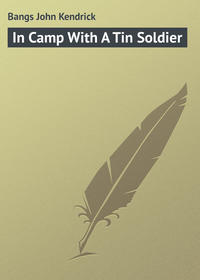 полная версия
полная версияThe Booming of Acre Hill, and Other Reminiscences of Urban and Suburban Life
I thanked him, and joyously referred the matter to the vestry. At first the members of that body were as pleased as I was, but after a few minutes of jubilation the Chairman of the Finance Committee asked; "How much will it cost to get this thing into shape?"
Nobody knew, and finally the acceptance of the gift was referred to a committee consisting of the Chairman of the Finance Committee, the Chairman of the Music Committee, and myself, with full power to act.
Inquiry showed that the cost of every item in connection with the acceptance of the gift would amount to about a thousand dollars, and we called upon Carson to complete the arrangement. He received us cordially. We thanked him for his generosity, and were about to accept the gift finally, when the Chairman of the Finance Committee said:
"It is very good of you, Mr. Carson, to give us this organ. Heaven knows we need it, but it will cost us about a thousand dollars to put it in."
"So I judged," said Carson. "But when it is in you'll have a thirty-five-hundred-dollar organ."
"Splendid!" ejaculated the Chairman of the Music Committee.
"The great difficulty that now confronts us," said the financier, "is as to how we shall raise that money. The church is very poor."
"I presume it is a good deal of a problem in these times," acquiesced Carson. "Ah—"
"It's a most baffling one," continued the financier. "I suppose, Mr. Carson," he added, "that if we do put it in and pass around a subscription paper, we can count on you for—say two hundred and fifty dollars?"
I stood aghast, for I saw the thread of Carson's philosophy snap.
"What?" he said, with an effort to control himself.
"I say I suppose we can count on you for a subscription of two hundred and fifty dollars," repeated the financier.
There was a pause that seemed an eternity in passing. Carson's face worked convulsively, and the seeming complacency of the Chairman of the Finance Committee gave place to nervous apprehension as he watched the color surge through the cheeks and temples of our host.
He thought Carson was about to have a stroke of apoplexy.
I tried to think of something to say that might relieve the strain, but it wouldn't come, and on the whole I rather enjoyed the spectacle of the strong philosopher struggling with inclination, and I think the philosopher might have conquered had not the Chairman of the Music Committee broken in jocularly with:
"Unless he chooses to make it five hundred dollars, eh?" And he grinned maddeningly as he added: "If you'll give five hundred dollars we'll put a brass plate on it and call it 'The Carson Memorial,' eh? Ha—ha—ha."
Carson rose from his seat, walked into the hall and put on his hat.
"Mr.—ah—Blank," said he to the financier, "would you and Mr. Hicks mind walking down to the church with me?"
"Say, he's going to put it in for us!" whispered Hicks, the Chairman of the Music Committee, rubbing his hands gleefully.
"Don't you want me, Carson?" I asked, rising.
"No—you stay here!" he replied, shortly.
And then the three went out, while I lit a cigar and pottered about Carson's library. In half an hour he returned alone. His face was red and his hand trembled slightly, but otherwise he had regained his composure.
"Well?" said I.
"Well, I'm going to put it up," said he.
"Now—see here, Carson," I remonstrated. It seemed so like a rank imposition on his generosity. To give the organ was enough, without putting him to the expense of erecting it.
"Don't interrupt," said he. "I'm not going to put it up in the organ-loft, as you suppose, but in a place where it is likely to be quite as much appreciated."
"And that?" I asked.
"In the hay-loft," he replied.
"I don't blame you," said I, after a pause.
"Neither do I," said he.
"But why did you go down to the church?" I asked.
"Well," he explained, chuckling in spite of himself. "It was this way. My grandfather, I have been told, used to be able to express himself profanely without using a profane word, but I can't, and there were one or two things I wanted to say to those men that wouldn't go well with the decorations of my house, and which couldn't very well be said to a guest in my house."
"But, man alive, you didn't go to the church to do your swearing?"
"No," he answered. "I did it on the way down; and," he added, enthusiastically, "I did it exceeding well."
"But why the church?" I persisted.
"I thought after what I had to say to them," said he, "that they might need a little religious consolation."
And with that the subject was dropped.
The organ, as Carson threatened, was transferred to the hay-loft and not to the church, and as for the two Chairmen, they have several times expressed themselves to the effect that Carson is a very irritable, not to say profane, person.
But I am still inclined to think him a philosopher. Under the provocation any man of a less philosophical temperament might have forgotten the laws of hospitality and cursed his offending guests in his own house.
THE PLOT THAT FAILED
Among the most promising residents of Dumfries Corners some ten years ago was a certain Mr. Richard Partington Smithers, whose brilliant début and equally sudden extinguishment in the field of literary endeavor have given rise from time to time to no little discussion. He was young, very young, indeed, at the time of his great literary success, and his friends and neighbors prophesied great things for him. Yet nothing has since come from his pen, and many have wondered why.
Thanks to Mr. Smithers himself I am enabled to make public the story of his sudden withdrawal from the ranks of the immortals when on the very threshold of the temple of fame.
Ten years have changed his point of view materially, and an experience that once seemed tragedy to him is now in his eyes sufficiently tinged with comedy, and his own position among us is so secure that he is willing that the story of his failure should go forth.
After trying many professions Smithers had become a man of schemes. He devised plans that should enrich other people. Unfortunately, he sold these to other people on a royalty basis, and so failed to grow rich himself. If he had only sold his plans outright and collected on the spot he might sometime have made something; but this he did not do, and as a consequence he rarely made anything that was at all considerable, and finally, to keep the wolf out of his dining-room, he was forced to take up poetry, that being in his estimation the last as well as the easiest resource of a well-ordered citizen.
"I always threatened to take up poetry when all else had failed me," he said to himself; "therefore I will now proceed to take up poetry. Writing is purely manual labor, anyhow. Given a pad, a pencil, and perseverance—three very important p's—and I can produce a fourth, a poem, in short order. Sorry I didn't get to the end of my other ropes before, now that I think of it."
And so he sat down and took up poetry.
He put it down again, however, very quickly.
"Dear me!" he ejaculated. "Now, who'd have thought that? Here I have the pencil and the pad and the perseverance, but I'm hanged if the poem is quite as easy as I had supposed. These little conceits aren't so easy to write, after all, even when they contain no ideas. Of course, it isn't hard to say:
"'Sweet month of May, time of the violet wild,The dandelion golden, and the mildEthereal sweetness of the blossoming trees,The soft suggested calor of the breeze,The ruby-breasted robin on the lawn,The thrushes piping sweetly at the dawn,The gently splashing waters by the weir,The rose- and lilac-laden atmosphere'—"because, after all, it's nothing but a catalogue of the specialties of May; but how the dickens to wind the thing up is what puzzles me. It's too beautiful and truly poetic to be spoiled by a completing couplet like:
"'And in the distant dam the croaking frogCompletes, O May, thy wondrous catalogue.'"Nobody would take a thing like that—and pay for it; but what else can be said? What do the violets wild, the dandelion, the ruby-breasted robin, and the lilac-laden atmosphere and other features all do, I'd like to know? What one of many verbs—oh, tut! Poetry very evidently is not in my line, after all. I'll turn the vials of my vocabulary upon essay-writing."
Which Partington, as his friends called him, proceeded at once to do. He applied himself closely to his desk for one whole morning, and wrote a very long paper on "The Tendency of the Middle Ages Towards Artificialism." Hardly one of the fifteen thousand words employed by him in the construction of this paper held fewer than five syllables, and one or two of them got up as high as ten, a fact which led Partington to think that the editor of the South American Quarterly Review ought at least to have the refusal of it. Apparently the editor of the South American Quarterly Review was only too eager to have the refusal of it, because he refused it, or so Partington observed in confidence to an acquaintance, in less time than it could possibly have taken him to read it. After that the essay became emulous of men like Stanley and Joe Cook. It became a great traveller, but never failed to get back in safety to its fond parent, Richard Partington Smithers, as our hero now called himself. Finally, Partington did manage to realize something on his essay—that is to say, indirectly—for after "The Tendency of the Middle Ages Towards Artificialism" had gone the rounds of all the reviews, monthlies, dailies, and weeklies in the country, its author pigeon-holed it, and, stringing together the printed slips it had brought back to him upon the various occasions of its return, he sent these under the head of "How Editors Reject" to an evening journal in Boston, whose readers could know nothing of the subject, for reasons that are familiar to those who are acquainted with American letters. For this he not only received the editor's thanks, but a six months' subscription to the journal in question—the latter of which was useful, since every night, excluding Sundays, its columns contained much valuable information on such subjects as "How to Live on Fifty Dollars a Year," "How to Knit an Afghan with One Needle," and "How Not to Become a Novelist."
Discouraged by the fate of his essay, Partington endeavored to get a position on a railway somewhere as a conductor or brakeman; but failing in this, he returned once more to his writing-table and wrote a novel. This was the hardest work he had ever attempted. It took him quite a week to think his story out and put it together; but when he had it done he was glad he had stuck conscientiously to it, for the results really seemed good to him. The book was charmingly written, he thought; so charming, in fact, that he did not think it necessary to have a type-written copy made of it before sending it out to the publishers. Possibly this was a mistake. For a time Partington really believed it was a mistake, because the publisher who saw it first returned it without comment, prejudiced against it, no doubt, by the fact that it came to him in the author's autograph. The second publisher was not so rude. He said he would print it if Partington would advance one thousand dollars to protect him against loss. The third publisher evidently thought better of the book, for he only demanded protection to the amount of seven hundred and fifty dollars, which, of course, Partington could not pay; and in consequence False but Fair never saw the light of day as a published book.
"Is it rejected because of its length, its breadth, or what?" he had asked the last publisher who had turned his back on the book.
"Well, to tell you the truth, Mr. Smithers," the publisher had answered, "all that our readers had to say about it—and the three who read it agreed unanimously—was that the book is immature. You do not write like an adult."
"Thanks," said Partington, as he bowed himself out. "If that's the truth, I'll try writing for juveniles. I'll sit right down to-night and knock off a short story about 'Tommy and the Huckleberry-tree.' I don't know whether huckleberries grow on trees or on huckles, but that will make the tale all the more interesting. If they don't grow on trees people will regard the story as romance. If they do grow on trees it will be realism."
True to his promise, that night Partington did write a story, and it was, as he had said it should be, about "Tommy and the Huckleberry-tree"; and so amusing did it appear to the editor of that eminent juvenile periodical, Nursery Days, because of what he supposed was the author's studied ignorance on the subject of huckleberries, that it was accepted instanter, and the name of Richard Partington Smithers shortly appeared in all the glory of type.
Partington walked on air for at least a week after his effusion appeared in print. He had visions night and day in which he seemed to see himself the centre of the literary circle, and as he promenaded the avenue in the afternoons he felt almost inclined to stop people who passed him by to tell them who he was, and thus enable them to feast their eyes on one whose name would shortly become a household word. All reasonable young authors feel this way after their first draught at the soul-satisfying spring of publicity. It is only that preposterous young person who was born tired who fails to experience the sensations that were Partington's that week; and at the end of the week, again like the reasonable young author, he began to realize that immortality could not be gained by one story treating of a fictitious Tommy and an imaginary huckleberry-tree, and so he sat himself down at his desk once more, resolved this time to clinch himself, as it were, in the public mind, with a tale of "Jimmie and the Strawberry-mine." This story did not come as easily as the other. In fact, Partington found it impossible to write more than a third of the second tale that night. He couldn't bring his mind down to it exactly, probably because his mind had been soaring so high since the publication of his first effusion. For diversion as much as for anything else during a lull in his flow of language he penned a short letter to the editor of Nursery Days, and announced his intention to send the story of "Jimmie and the Strawberry-mine" to him shortly—which was unfortunate. If he had finished the story first and then sent it, it might have been good enough to convince the editor against his judgment that he ought to have it. A concrete story can often accomplish more than an abstract idea. In this event it could not have accomplished less, anyhow, for the editor promptly replied that he did not care for a second story of that nature. There was no particular evidence in hand, he said, that the children liked stories of that kind particularly, adding that the first was only an experiment that it was not necessary to repeat, and so on; polite, but unmistakably valedictory.
"No evidence in hand that they are liked, eh? Well, how on earth, I wonder," Partington said, angrily, to himself, "do they ever find evidence that things are liked? Do they go about asking subscribers, or what?"
And then he picked up the issue of Nursery Days that had started him along on his way to immortality, to console himself, at all events, with the sight of his published story. In turning over the leaves of the periodical his eye fell upon a page across the top of which ran a highly ornate cut which indicated that there was printed the "Post-office Department of Nursery Days," on perusing which Partington found a number of communications and editorial responses like these:
I
"DEAR POSTMASTER,—I have been taking Nursery Days since Christmas, so I thought I would write you a letter. My birthday came a week ago Thursday. I received a watch and chain, a glove-buttoner, a penknife, and a set of ivory jackstraws. We have a cat at home whose name is Rumpelstiltzken. He is very sleepy, and sleeps all day. He always picks out the most comfortable chair, and then feels very much injured if we turn him out. I like Bolivar Wiggins's story in your last paper very much. Are you going to have any more stories by Bolivar Wiggins?
"Your little friend, "HELEN CHECKERBY, aged seven.
"[We hope soon to have a new story from Mr. Wiggins, Helen. We wish we could see your cat. He seems a very sensible cat.—EDITOR Nursery Days.]"
II
"CANADA.I am a little girl nearly ten years old, and as I like your paper very much I thought you would like a letter from me. Here is a cow's head I drew. It is not very good, but I wanted to see if I would get a prize or not. I have two little sisters; their names are Jennie and Fanny. I hope I will see my letter in print. The stories I like best are Bolivar Wiggins's story about 'Solemn Sophy' and his other one about 'Bertie's Balloon.' Have you any more stories by him? I must close now, so good-bye.
"LILLIAN JAMES.
"[Several, Lillian. Your cow is beautiful, and perhaps some day it will appear in this column. Watch carefully, and maybe you will see it.—EDITOR Nursery Days.]"
"Ah!" said Partington, softly, as he read these effusions. "That is why Bolivar Wiggins is permitted to cover so much space, eh? The children like his stories well enough to write letters about him—or perhaps Bolivar himself—ah!"
The second "ah" uttered by Partington indicated that a thought had flashed across his mind—a thought not particularly complimentary to Bolivar Wiggins.
"Perhaps," he said, slowly, "Bolivar writes these letters to the editor himself—and if Bolivar, why not I?"
It was a tempting—alas, too tempting—opportunity to supply the editor of Nursery Days with the needed evidence that stories of the "Tommy and the Huckleberry-tree" order were the most popular literary novelty of the day, and to it, in a moment of weakness, Partington succumbed. I regret to have to record the fact that he passed the balance of the night writing letters from fictitious "Sallies, aged six," "Warry and Georgie, twins, aged twelve," and others dwelling in widely separated sections of the country, to the number of at least two dozen, all of which, being an expert penman, Partington wrote in a diversity of juvenile hands that was worthy of a better cause. Here are two samples of the letters he wrote that night:
I
"NORWICH, CONNECTICUT."I have taken the Nursery Days for one year, and think it is a very nice paper. For pets I have two cats, named Lady Tompkins and Jimpsey. I have tried to solve the 'Caramel Puzzle,' but think one answer is wrong. I go to school, and there are forty-four scholars in my room. My little kitty Jimpsey sleeps all day long, and at night she is playful. She wakes me up in the morning, and then waits till I get up. Who is Mr. Smithers who wrote that beautiful story about 'Tommy and the Huckleberry-tree'? Everybody of all ages, from baby to my grandmother, likes it and hopes you will print more by that author.
"SARAH WINKLETOP."
II
"YONKERS, N.Y."Our Uncle Willie in New York sends us Nursery Days every week. We like it immensely, and every one tries to get the first reading of it. "Tommy and the Huckleberry-tree" is a splendid story. Papa bought six copies of Nursery Days with that in it to send to my little cousins in England.
"JIMMIE CONWAY RHODES."
Others were more laudatory of Partington's story, some less so, but each demanded more of his work.
These written, Partington made arrangements to have them posted from the various towns wherein they were ostensibly written, and then, when they had been posted, he chuckled slightly and sat down to await developments.
It took a trifle over one week for developments to develop, and then they developed rapidly. Just eight days after his conception of this magnificent scheme the postman whistled at Partington's door and left this note:
OFFICE OF NURSERY DAYS,NEW YORK, March 16, 1889."Richard Partington Smithers, Esq.:
"DEAR SIR,—Can you call upon me some afternoon this week? Yours truly,
THOMAS JACKSON TORPYHUE,"Editor Nursery Days.""The bait is good, and I'll land the fish at once," said Partington, his face wreathing with smiles. "I'll call upon Mr. Thomas Jackson Torpyhue."
And call he did. Two hours later he entered the sanctum of the editor of Nursery Days.
"Good-afternoon," he said, as he sat down at the editor's side.
"Good-afternoon, Mr. Smithers," said Mr. Torpyhue. "I'm very glad to see you."
"I thought you'd be," began Partington, forgetting himself for a moment in his triumph. "If that wasn't evidence enough that I—ah– oh—er—ah! Ahem! Why, certainly," he continued, suddenly recalling the fact that as yet he could properly have no knowledge of the evidence in question.
The editor threw his head back and laughed, and Partington forced himself to join him, nervously withal.
"You have heard of the evidence have you?" asked Mr. Torpyhue.
Partington gasped faintly, and said he thought not.
"Well, it's very strange, Mr. Smithers," said Mr. Torpyhue, "but do you know that you have developed into one of our most popular authors?"
"Indeed?" queried Partington, pulling himself together and trying to appear gratified.
"Yes, sir. Here is a bundle of twenty-four letters all received within three days. One of the letters calls you the best writer of short stories of the day. Another, from Canada, written by a parent, says that you have written one of the most delightful bits of juvenile humor that he has seen in forty years."
"How extremely flattering!" said Partington, faintly.
"Yes, extremely," assented the editor, dryly. "And now, Mr. Smithers, I'm going to do for you what this paper has never done even to its most popular author in the past."
"Now, my dear Mr. Torpyhue," began Partington, gaining courage, "I beg you not to feel called upon to discriminate against your old favorites in my favor. Your present rates of payment are entirely satisfac—"
"You misunderstand me, Mr. Smithers," interrupted Mr. Torpyhue. "What I'm going to do to you that I never before have done even to our most popular author is to return to you at once every one of those highly entertaining manuscripts you have favored us with—we receive so many real letters from real children that, of course, we cannot afford to buy from you purely fictitious ones. These of yours are excellently well done, but you see my point. One does not pay for things that can be had gratis. Perhaps later you will try us with something else," he added, with a grin.
Here Mr. Torpyhue paused, and Partington tried to think of something to say. It was all so sudden, however, and, in spite of his misgivings, so extremely unexpected, that his breath was taken away. He had neither breath nor presence of mind enough left even to deny the allegation, and when he did recover his breath he found himself walking dejectedly down the stairs of the Nursery Days building with his bundle of encomia in his hands.
"I wonder how he caught on!" he groaned, as half an hour later he entered his room and threw himself face downward on his couch.
Investigation after dinner gave him a clue.
Not one of the letters had been mailed from the town in which it had been dated. The envelope containing the Washington letter bore the Boston postmark. The Brooklyn missive had been sent from Chicago, that from Norwich had been posted at Yonkers, and vice versa, and so on through the whole list. Each and every one had, through some evil chance, started wrong. In addition to this, Partington found that in a forgetful moment he had appended to two of the communications an editorial response promising more work from Mr. Smithers.
"I must have been muddled by my success with 'Tommy and the Huckleberry-tree,'" he sighed, as he cast the documents into the fire. "If that's the effect literary honors have on me I'd better quit the profession, which leaves only two things to be done. I shall have to commit one of two crimes—suicide or matrimony. The question now is, which?"
He thought deeply for a moment, and then, putting on his hat and overcoat, he turned off the gas and left the room.
"I'll call on Harris, borrow a cent from him, and let the toss decide," he said, as he passed out into the night.









